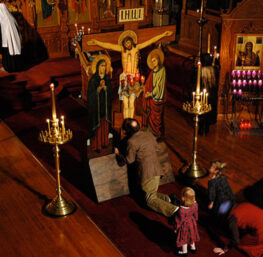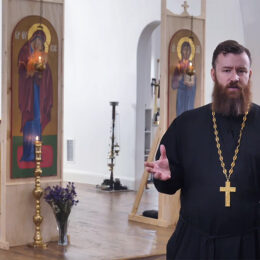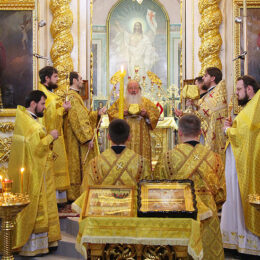Pope dream: Healing ancient Christian rift a distant glimmer
BRIAN MURPHY The Associated Press
ATHENS, Greece – It’s a goal that has eluded Christianity for nearly 1,000 years: mending the rifts between the Roman Catholic and Orthodox churches. Pope Benedict XVI has declared a “fundamental commitment” to heal the divide, and this week will engage in an indirect round of talks with the Russian Orthodox.
In spiritual terms, it’s an epic invitation to repair the broken foundation of the faith – at a time when the European Union is erasing the last Cold War separations and some Christian leaders appeal for greater cooperation to challenge the rise of militant Islam.
But then comes a reality check. Even the smallest steps toward reconciliation can kick up disputes that require the finesse of a diplomat and the perspective of a historian to overcome. And, in the end, any serious bids at rapprochement will force the Vatican to confront some core differences such as honoring Orthodoxy’s traditions of autonomous leadership and married clergy.
Greek theologian Athanasios Papathanasiou calls it “the pain of brotherly debate.” It’s made more acute because the ancient divide reaches beyond religious differences, which are mostly over liturgical points and joint recognition of sacraments. The bigger gulf, clerics and theologians say, is one of conflicting perceptions and priorities.
When Vatican leaders look east, they see a patchwork of Orthodox churches with a shared fellowship in the roots of Christianity. May 29 in Italy’s Adriatic port of Bari, Benedict declared a “fundamental commitment” to advance dialogue with the leaders of the world’s 200 million Orthodox and 1.1 billion Catholics.
The Orthodox view of the West, however, is often shaded by historical grievances – religious and political – and deep suspicion of Vatican motives and power.
“It’s not an even equation,” said Thomas Groome, director of the Boston College Institute of Religious Education and Pastoral Ministry. “The deeper skepticism to any improved relations resides within Orthodoxy.” No clear vision exists about what type of unity is even possible or desirable.
For the faithful, one important landmark would be a formal pact on mutual recognition of baptism, marriage and other aspects of church life. But that would need the Orthodox to speak in a single voice – something that’s
nearly impossible now. The Orthodox world is divided among more than a dozen autonomous churches and other congregations, each with different views.
The Vatican, too, could be pushed into some unfamiliar spots.
Closer bonds with married Orthodox clergy don’t present a distinct problem. The Vatican’s priestly ranks include married Eastern Rite clerics and some Anglican priests who converted to Catholicism. It could, however, put added pressure on the Vatican to reconsider its ban on married clergy.
A bigger challenge is sorting out the main reason for the split 10 centuries ago: the clout of the papacy versus the Orthodox view of equal distribution of power among its churches.
“Can Rome devise a new way of thinking of primacy that does not lead to dominance over any other churches?” said Anton Vrame, director of the Patriarch Athenagoras Orthodox Institute in Berkeley, Calif. “That is the question only Benedict and the Vatican can answer.”
It may not be needed for a long time. Church experts from both sides believe any increased collaboration in coming years may be slow and safe – such as possible joint declarations on social issues or sharing resources
for aid work and Christian education. A hint of common ground emerged last month in Ukraine, where Catholic and Orthodox leaders put aside their many internal disputes to urge the government to keep Christian-oirented classes in schools.
Last month, the head of Russia’s small Catholic community, Archbishop Tadeusz Kondrusiewicz, said the pontiff seeks to join forces with Orthodox to battle “aggressive secularism.” Similar dialogue is ongoing with the two churches and the many Protestant denominations.
“Don’t expect big things in a short time,” said Brother Jeff Gros, a spokesman on interreligious affairs for the U.S. Conference of Catholic Bishops. “If anything, this will be a gradual evolution.”
A World Council of Churches conference last month outside Athens – bringing together clerics and scholars from nearly every Christian denomination – demonstrated the sensitivities.
The head of the Greek Orthodox church, Archbishop Christodoulos, welcomed more than 700 delegates with a call for greater contacts among Christians. But he added some direct swipes against the West – a point-by-point litany of past and present wounds felt by most Orthodox.
They go back to the Crusades, including the 1204 sacking of Constantinople, the ancient center of Greek Byzantium and now – as mostly Muslim Istanbul, Turkey – still the spiritual center of Orthodoxy. Christodoulos zeroed in on the main contemporary obstacle: The growing Eastern Rite churches that follow most Orthodox traditions but are loyal to the Vatican.
Many Orthodox see these churches as Roman Catholic encroachment and attempts to poach followers. Hard-line Orthodox go further. To them, all non-Orthodox Christians are heretics. “Repent!” a small group of Orthodox zealots shouted through bullhorns outside the conference.
Rifts between the two ancient branches of Christianity began as early as the fifth century over the rising influence of the papacy and later over wording of the creed, or confession of faith. The split was sealed in 1054
with an exchange of anathemas – or damnations – between the Holy See and the patriarch of Constantinople.
Centuries of cultural separation deepened the estrangement and the Protestant Reformation in the 16th century further fragmented Christianity.
Pope John Paul II turned his attention to the Orthodox world late in his nearly 27-year papacy. He traveled to several predominantly Orthodox nations and built close ties with Ecumenical Patriarch Bartholomew I, the “first among equals” among Orthodox leaders. In Greece in 2001, John Paul apologized for “sins of action and omission” by Catholics against Orthodox.
The mutual outreach wasn’t enough to win over one of the most powerful figures in Orthodoxy, the ailing Russian Patriarch Alexy II. He refused to allow a papal trip to the world’s most populous Orthodox nation. Benedict appears content to move slowly on any proposals to visit Russia, but one of his first meetings as pontiff in April was with the Russian church’s top foreign affairs envoy.
This month offers another chance for high-level messages.
June 16, the general secretary of the World Council of Churches, the Rev. Samuel Kobia, is scheduled to visit Benedict at the Vatican. Kobia then heads for talks with the Russian Church leaders from June 18-24.
The Geneva-based group includes the Orthodox churches. The Vatican is not a full member, but participates on many levels. The pope – then German Cardinal Joseph Ratzinger – served on a WCC panel in the 1970s.
Meanwhile, a joint commission is expected to be formed by next year to “set out an agenda” on improving relations, said the Rev. Brian Farrell, a member of the Vatican’s Pontifical Council for Promoting Christian Unity. The council president, Cardinal Walter Kasper, also urged a pan-Christian synod – Catholics, Orthodox and Protestants – to “form an alliance to rediscover the Christian roots of Europe.”
Among the Orthodox, Russia is the heavyweight. But it’s not the only voice. Smaller Orthodox churches have power to shape the dialogue. At least one, the Macedonian Orthodox Church leader, believes it’s “still too early” to talk seriously of moving closer.
“There are too many differences from the past which cannot be easily resolved,” said Archbishop Timotej. “It would be very difficult to ensure a full reconciliation. This is more the pope’s good will (gesture) than reality.”




We Orthodox have unity of the faith but absolutely no jurisdictional unity at all. I both laugh and cry when I read the oft repeated phrase that the Patriarchate of Constantiople is the “spiritual center of Orthodoxy”. Its not.
We simply do not need to spend our time and energy debating union with Rome. We can work with them in many productive and meaningful ways and we should–even if they are heretics(which IMO has lost any substantial meaning in their case at this point).
We do need to spend our prayers for more solid unity within the Orthodox communion so we can fulfill our responsibility to witness to the world in a stronger, more effective way. We are barely a patchwork as far as the world can see.
Well said, Michael. I think we have something else that we need to do. I think we’re at a place where we have the opportunity to do something more important and profound than doctrinal reconciliation, or recongnition of each other’s sacraments. I think now is the time for us to look our Roman Catholic sisters and brothers in the eye and forgive them from our hearts for all those lingering humilations and the bitterness which we still harbor, and to truly and finally put these things to rest. It’s time for us to forget the offenses committed and humiliations received. Without that first step, I don’t think anything else is possible. But if it happens, then I believe that a real and honest dialogue among those who are the successors of the Apostles can open up. This is something that we can do to move forward in brotherly love and commitment to work together as servants of Christ to do that which the Lord has given us to accomplish in our daily lives. I think the Master’s admonition on forgiveness needs to be central to how we move forward.
“And when you stand praying, if you hold anything against anyone, forgive him, so that your Father in Heaven may forgive you your sins. But if you do not forgive, neither will your Father who is in Heaven forgive your sins.” (RSV) Mark 11:25-26
As for sacramental recognition, and theological statements and determinations, those are in the hands of the ones who God has given authority over his One, Holy, Catholic and Apostolic Church, and we all continue to pray that God will guide them in all matters as they carry out what can only be called awesome responsibilities. But forgiveness is what we, the laity, can and must do now. Forgiveness is required of us. Everything beyond that is in God’s Hands.
I am interested in how Orthodox and Catholics are supposed to work together. By jointly becoming Republicans? By joining the same civic committees, car-pools, and quilting bees? This is already happening, and has been happening. So, specifically, what is all this talk about “working together” mean?
I get the sense that the Vatican’s phrase of “working together” in the context of Russia has to do with allowing the Vatican to open missions that prey on vulnerable Orthodox Christians. Patriarch Aleksy has a duty as Patriarch to be disturbed by this. When Patriarch Aleksy says that Catholics should “work together” with the Orthodox, he seems to be telling the Vatican to cease and desist. I don’t get the sense that His Holiness is interested in bearing grudges here.
Michel and Andrew,
Very touching words. Thank you.
Stephen
You see malice where there�s none.
EP’s response,”…we must be realistic about the cost and the time involved in this process.”
Pastor Wants to Move Past Vatican Dispute
By NICOLE WINFIELD
Associated Press Writer
Published June 16, 2005, 5:07 PM CDT
VATICAN CITY — The leader of the World Council of Churches said Thursday he wanted to move beyond a rift between the Roman Catholic Church and other Christians over mutual recognition and welcomed indications from Pope Benedict XVI that he, too, wanted to improve ties.
The Rev. Samuel Kobia, a Methodist pastor and general secretary of the Geneva-based council, said he was encouraged by pledges from the new pope to make improving relations with other Christians and healing the 1,000-year-old rift with the Orthodox Church a “primary” task of his papacy.
In Turkey on Thursday, the spiritual leader of the world’s Orthodox Christians, Ecumenical Patriarch Bartholomew I, also welcomed Benedict’s outreach but said both sides must be “realistic about the cost and the time involved in this process.”
During a meeting with Kobia at the Vatican, Benedict repeated his pledge that “concrete gestures” were necessary to forge unity. “The commitment of the Catholic Church to the search for Christian unity is irreversible,” Benedict said.
The World Council of Churches is a fellowship of more than 300 churches from nearly all Christian traditions, including Protestants and the Orthodox. The Roman Catholic Church is not a member but cooperates with it.
Protestants were deeply offended by a 2000 document, “Dominus Iesus,” from the Vatican’s Congregation for the Doctrine of the Faith that framed the role of the Catholic Church in human salvation in an exclusive manner.
The document, written by Benedict when he was Cardinal Joseph Ratzinger and prefect of the congregation, said non-Catholic or Orthodox “ecclesiastical communities” were “not churches in the proper sense.”
Kobia told a news conference after his meeting with the pope that he wanted to make Benedict’s statements since he became pontiff, not those he made before, “the point of departure” for ecumenical discussions.
He said that in his discussions with Benedict, “I have said that one of the concrete steps that will take us closer to the unity that we seek is by the recognition, the mutual recognition of churches as churches.”
Benedict made no mention of the issue in his remarks to Kobia, although he stressed his desire to work “tirelessly” to unify all Christians.
In an interview before the meeting, Kobia said he wasn’t asking Benedict to renounce “Dominus Iesus,” but merely put it behind him.
“There are many Protestant churches that are members of the WCC and are concerned that they are defined as ‘ecclesiastic communities’ and not full churches,” Kobia told The Associated Press. “I don’t want to revive all the pain that many churches felt after Dominus Iesus. If we could say we have moved beyond it, it would be helpful.”
In his remarks to the pope, Kobia said Orthodox members of the World Council of Churches often are asked to reflect on whether there was “space” for other churches in Orthodox doctrine.
Responses to these fundamental questions “will certainly affect whether or not our member churches recognize each other’s baptism, as well as their ability or inability to recognize one another as churches,” he said.
Benedict has emphasized his pledge to ecumenism on several occasions in his nearly 2-month-old papacy, gestures welcomed by Bartholomew I.
“Such rapprochement — what Pope Benedict XVI called ‘spiritual ecumenism’ — is our obligation to God and our commitment to the world,” Bartholomew said in written responses to questions from the AP. “At the same time, we must be realistic about the cost and the time involved in this process.”
Bartholomew said reconciliation won’t be easy.
“The genuine work of unity is slow and painful, and it must be treated with sensitivity to theological truths, honesty before historical events, and realism in the face of cultural distinctions. This is why reconciliation can only blossom when there is sincerity and continuity in this delicate process of healing,” Bartholomew wrote.
Bartholomew has long been receptive to Rome’s outreach to the Orthodox, meeting several times with John Paul II. However, the main resistance to improved ties has come from the Russian Orthodox Church, which refused John Paul’s longtime request to visit Russia.
Russian Orthodox Patriarch Alexy II called for more cooperation with the Roman Catholic Church following Benedict’s recent remarks. But he continued to urge Rome to stop what he considers the poaching of souls in his territory — the main source of tension between the two churches.
* __
Associated Press writers James C. Helicke in Ankara, Turkey, and Daniela Petroff in Rome contributed to this report.
Note 4: Delance, no, I don’t see malice here on either the Pope or the Patriarch’s part. I do see a conflicting agenda and also a different meaning applied by both parties’ to the phrase “working together”. I think both the Pope and Patriarch would like the other to “work together” with their own understood agenda. I don’t think its based upon any maliciousness. It will be interesting to see in what concrete way the Orthodox and Catholics will actually “work together” in that context. The touted problem of “secularism” seems something of a smokescreen here.
This is a document from the Moscow Patriarchate’s website expressing their grievances with Catholic proselytism in Russia:
While the Pope may be reaching out in words to the Orthodox, in actuality Rome is apparently ignoring the already established Orthodox presence in Russia, seeing it instead as unmissionised territory. Again, I don’t think there is maliciousness here on the part of the Vatican or the Patriarchate, just mutual frustration.